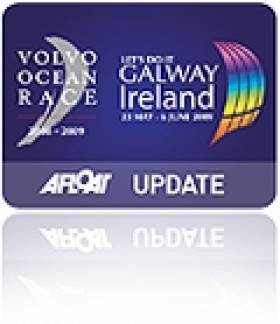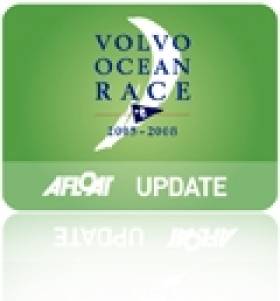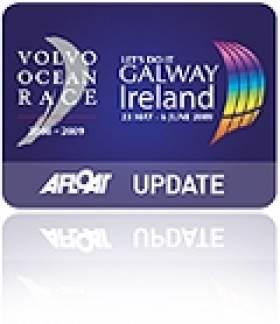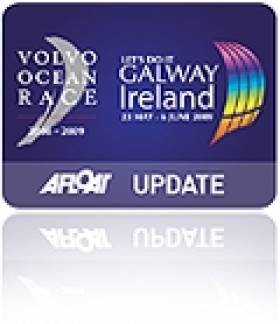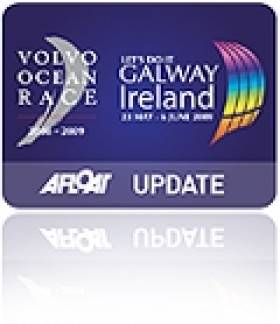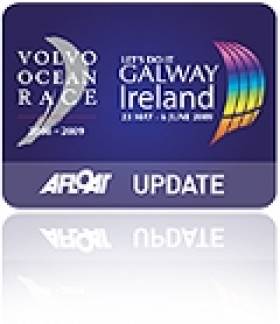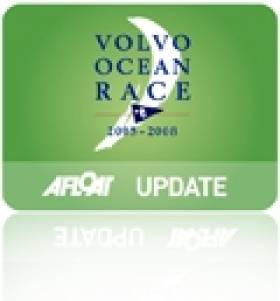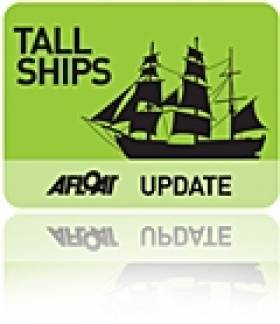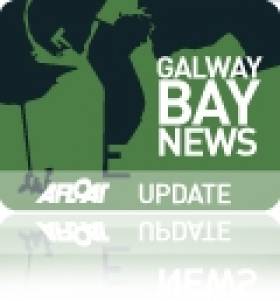Displaying items by tag: Let's Do It Global
'Bailout' Sanctioned for Galway VOR Stopover
#VOR - The Galway City Tribune reports that Taoiseach Enda Kenny has sanctioned a bailout for outstanding debts owed by the organisers of this summer's Volvo Ocean Race finale in Galway.
Minister for Tourism and Sport Leo Varadkar had previously ruled out any Government assistance to cover the €400,000 in debts owed by Let's Do It Global to numerous suppliers.
Let's Do It Global was subsequently moved to declare that a decision on bidding to host a third stopover is "postponed" while it concentrated on settling with its creditors.
But now unconfirmed reports suggest that Government funding will be provided in January to cover €360,000 of the debt.
Galway West TD Brian Walsh told the Tribune he is "confident that the issue in relation to debts will be sorted out, and that the creditors - many of whom are small businesses - will be paid."
Though it is unclear when Galway will be prepared to tender for a third hosting of the round-the-world yacht race, organisers for Dun Laoghaire have recently announced their intention to bid for the 2016 race - and cash in on the success of the event in the City of the Tribes this year.
Cardiff to Make Bid for Volvo Ocean Race
#VOLVO OCEAN RACE - Cardiff in Wales is submitting a bid to host the 2017-2018 edition of Volvo Ocean Race, as yourCardiff reports.
The city's council has signed off on £3 million (€3.7 million) plans to host a stopover on the race route, bidding alongside a shortlist of 30 other cities ahead of an official decision by the race authorities in December.
Cardiff's bid is subject to confirmation of support from the Welsh government and the Cardiff Harbour Authority to cover the costs of the race village, entertainment and media facilities, and management of the race itself over a proposed two-week stopover.
It's estimated that the VOR could bring in millions to the city's economy and "expand Cardiff's reputation as an event city by hosting one of the most important sailing events in the world", according to a report submitted to the council.
The news comes days after organisers of this summer's Volvo Ocean Race finale in Galway postponed their decision on making a third bid to host the race, as previously reported on Afloat.ie.
Let's Do It Global said the move was to enable the group to concentrate on paying off its outstanding debts of €400,000 which it says were incurred in the wake of "adverse weather" and increased security costs due to the "outstanding success of the event".
#VOLVO OCEAN RACE - The organisers of the Volvo Ocean Race finale in Galway have hit out at media reports that the city will not put in a bid to host a stopover for a third time in 2014-2015.
According to the Galway Independent, Let's Do It Global have said the decision on making a bid has been "postponed" for the time being while the group concentrates on paying off its outstanding debts
As previously reported on Afloat.ie, €400,000 is owed to some 60 suppliers by Let's Do It Global, who themselves are owed in the region of €170,000 from various debtors.
Hopes that Minister for Tourism and Sport Leo Varadkar would step in to make up the shortfall were dashed last weaken when he ruled out any Government bailout, pointing to the substantial funding already provided via Fáilte Ireland.
A spokesperson for Let's Do It Global told the Galway Independent that cost-cutting measures were reviewed at a meeting with stakeholders on Monday, with the "outstanding success of the event and adverse weather" being highlighted as reasons behind the budget over-run.
The Galway Independent has more on the story HERE.
Minister Dashes Hopes of Paying Off Volvo Ocean Race Debts
#VOLVO OCEAN RACE - Minister for Tourism and Sport Leo Varadkar has ruled out any Government bailout to cover the €400,000 in debts owed by organisers of the Volvo Ocean Race finale in Galway, as the Galway City Tribune reports.
Some 60 suppliers have not yet been paid by organisers Let's Do It Global, who are set to meet with stakeholders this coming Monday to discuss the situation.
The race organisers are themselves owed in the region of €170,000 from their own debtors, but even if collected this would cover less than half the value of their own debt.
Hopes that Minister Varadkar might step in to make up the shortfall were dashed on Wednesday when, speaking to Galway Bay FM, he confirmed that the event already received State funds through its sponsorship by Fáilte Ireland, and that as his own department was operating at a deficit no other funding was available.
A spokesperson for his department added that the Fáilte Ireland sponsorship "was the biggest allocation to any tourism event in 2012".
The news all but rules out the potential third bid to host the event, at least for the foreseeable future.
'Last Ditch Efforts' for Galway Volvo Ocean Race Bid
#VOLVO OCEAN RACE - The organisers of this summer's Volvo Ocean Race stopover in Galway are set to hold meetings with stakeholders in what Galway Bay FM calls a 'last ditch' effort to make a third bid to host the event.
Let's Do It Global will meet in the coming weeks with Galway City Council, Galway Port officials, publicans, hotel owners and the media with a view to drumming up much needed financial support for a bid submission, the deadline for which is the end of this month.
As previously reported on Afloat.ie, Galway City Council has already announced it is not in a position to underwrite the bid, leading Let's Do It Global to describe its application as "unlikely" without a "different mechanism" of funding support like the city or state partnerships in other host ports.
Organisers have also questioned the will at Government level to back up their hosting of the round-the-world yacht race, despite expressions of support and assurances from Galway TDs.
Meanwhile, the organisers of the Volvo Ocean Race are currently recruiting for a brand and marketing managers to join their commercial team in Alicante as plans build up steam for the next edition of the race in 2014/2015.
Full details of the postion are available on the Volvo Ocean Race website HERE.
Galway Businesses Urged to Leave Volvo Ocean Race Legacy
#VOLVO OCEAN RACE - Businesses in Galway "must not abuse their affiliation" with the Volvo Ocean Race when taking advantage of its visit to the city this summer, a meeting hosted by the organisers heard on Monday.
As the Galway Independent reports, Galway Chamber president Declan Dooley urged business community to ask what it can do to help the event, rather than expecting the event to do something for its business.
He added that it was “critically important” that businesses ensured the expected 600,000 visitors to Galway were treated with "friendly service" and not "ripped off".
Also at the meeting at the Meryck Hotel, Let’s Do It Global MD Micheline McNamara outlined plans for the the Global Village and Race Villages and explained how businesses could get involved.
She said: “We want to develop a business legacy, so that when the boats leave, there are trade relationships, and business relationships that stay on."
As previously reported on Afloat.ie, organisers of the Volvo Ocean Race stopover this July have promised the event will be "bigger and better" than the previous visit in 2009.
The Galway Independent has more on the story HERE.
Crucial Stage for Volvo Ocean Race Sponsorship Talks
Negotiations to land €11 million in sponsorship for the finals of the Volvo Ocean Race in Galway next summer are at a 'delicate stage', the Galway City Tribune reports.
Six teams have so far been confirmed for the world's biggest sailing event, and Irish organisers are in talks with a number of potential overseas sponsors.
“We are at a delicate stage in negotiations in relation to a number of issues and plans are on track for a much bigger event this time around,” said John Killeen of Let’s Do It Global, a team that in its previous incarnation had Chinese sponsorship for its 2009 entry in the race.
The Volvo Ocean Race is set to attract more than half a million visitors, with close to 50,000 corporate guests, and is expected to bring in €80 million for the local ecomony in Galway.
The Galway City Tribune has more on the story HERE.
Tall Order for Ireland
Sailing in Ireland could yet have a tall ship to replace the Asgard II and the Lord Rank. A meeting in Dublin in late March represents a major step forward in the process to put an Irish tall ship back on the high seas.
The open workshop, to be held on March 26th, will be facilitated by Dublin Port, and will include state interests, tourism interests, commercial port interests, youth organisations, maritime organisations and education groups, together with the former Lord Rank and Asgard II operators.
The catalyst for the initiative is a 'reference group' which represents a broad cross-section of interests, both North and South. Operating under the chairmanship of Lord Glentoran, and supported by Dr Gerard O'Hare, David Beattie and Enda O'Coineen, the group has also engaged a professional consulting firm to move the process along.
The initial focus is on the necessary organisation and rationale behind building a new vessel, while scientifically quantifying the benefits to build a plan and justification.
The view taken is that, while there may be no money available at this time, there is no excuse for not having a plan and the idea is to create ' joined-up' thinking. And while the government in the South placed the insurance money paid out on Asgard II back into general exchequer funds, the insurance payment on the Lord Rank was kept and ' ring-fenced' for this new initiative.
To date, there have been several meetings of the reference group. The planned workshop on the subject at Dublin Port March 26 is open and interested parties are invited to contribute. It will also bring together for the first time the leaders of Tallships in Dublin, Belfast, Waterford and Cork.
Ultimately Tall Ships is about youth training and development; without an active Tall Ship, it will be very difficult for Ireland to attract Tall Ship events. The new reference group will work to support the new Sail Training Ireland Association initiative, and link in with Sail Training International which runs Tall Ship events.
Following the Dublin workshop, Belfast Harbour Commissioners will host a working meeting of the group in early May to finalise a plan, present to stakeholders and create a roadmap forward.
"In addition to youth training, a working Tall Ship forms a brilliant ambassadorial role promoting tourism, enterprise and commercial interests," said Lord Glentoran. "It is something that we can all relate to and it has universal acceptance for youth training on an island of Ireland basis." Lord Glentoran has a long commitment to youth sail training and was Chairman of the organising committee that brought the Tall Ships to Belfast in 1991.
The reference group is seeking to engage with as many stakeholders as possible, and has pledged that the new vessel will be owned by the community in Ireland and the Irish Diaspora. The initial view is that the project clearly needs to be linked with the institutions of State - North and South - as are universities state agencies and ports, while at the same time having a strong private support network making for a mix of public and private funding, "We now have a brilliant opportunity to look around the world, establish best practice in the best kind of vessel, how to fund it and to quantify the benefits for each of the stakeholder group," said Enda O'Coineen, who has been instrumental in bringing the group together. In addition to being a former Coiste and Asgard Director, he is the founding Chairman of Let's Do It Global, which brought the Volvo Ocean Race to Galway and successfully raced the Green Dragon around the world.
O'Coineen added that a "world class solution" can be created and that its benefits can be financially quantified, which would allow supporters to make a compelling business case to divert and use existing funds in Tourism, Enterprise and Youth Training. "While there is no money available now to support the scale and professionalism needed, this is not an excuse not to have a plan and a vision," he added.
Since the loss of the Asgard II and Lord Rank, Ireland has been left with no sail training opportunities for young people and likewise for maritime development, enterprise and tourism. If nothing is done, future generations will suffer. The reference group believes that the solution is the construction of an Ireland - North and South - training vessel, fulfilling several roles with a common mission and resourced according to quantifiable benefits delivered to stakeholders. It is also open to the use of an existing vessel - a key component being suitability and the operations budget.
The proposed Tall Ship project will enhance skills and opportunities for young people across the island, regardless of background, class or education. It could be used to showcase Ireland as a brand at overseas events and it could also host international students who wish to come to the island of Ireland, as is the case with many of the International Tall Ships Programmes already running on a global scale which create a huge amount of tourism for their respective countries.
The reference group notes that the Tall Ships concept appeals to young and old alike as the romanticism behind the concept touches on history, social studies, legacy, family, travel, adventure and, most importantly, fun. Tall Ships allow people to dream. They do however have an underlying seriousness and the concept is grounded in methodology that has been tested and proven the world over.
An advertisement in March/April of Afloat magazine - out now - gives full detials of the 'Tall Ship for Ireland' Workshop
Should Ireland be represented at the Tall Ships Races at Waterford 2011 and Dublin 2012? We want your vote on our Facebook Poll HERE.
Looking for further reading on Tall Ships in Ireland? Click the links below:
Click this link to read all our Tall Ships Stories on one handy page
Previewing Ireland's Tall Ships 2011 Season
New Ocean Centre to Open in Galway
The centre will provide facilities for all the watersports organisations in the city and region and is located in the new Galway Harbour Enterprise Park adjacent to the new harbour slipway that was built specifically for the Volvo Ocean Race in 2009. The 25,000 sq ft premises is being provided by Cold Chon (Galway) Ltd for a nominal rent and the land is being provided free by Galway Harbour Company.
Some of the clubs that have already committed to this new facility include the Galway Sea Scouts, Galway Sea Sports Association, Galway Sub Aqua Club, Bádoiri an Cladaigh, OYTI, Galway Coastal Rowing, Kayak Mor and Galway Bay Sailing Club.
'The Harbour Company is pleased to assist in pulling together the various water sport bodies under one roof and in the heart of the harbour. The new facility and the recently constructed slipway will be the focal point for Galway's marine leisure, getting Galwegians afloat and established in the city, commented Harbour Master', Captain Brian Sheridan.
The Centre is also hosting Let's Do It Global which ran the very successful Green Dragon campaign and the Galway Volvo Ocean Race Festival. The team is now working towards hosting a spectacular finish to the Volvo Ocean Race 2011-12 in July 2012.
The centre will provide operational facilities such as offices, changing rooms and storage facilities. There will be no social amenities or bars at the centre however it is anticipated that the establishment of the centre will provide impetus for attracting further watersport events to Galway.
The launch will take place at The Galway Ocean Sports Centre, Galway Harbour Enterprise Park, Galway City.


























